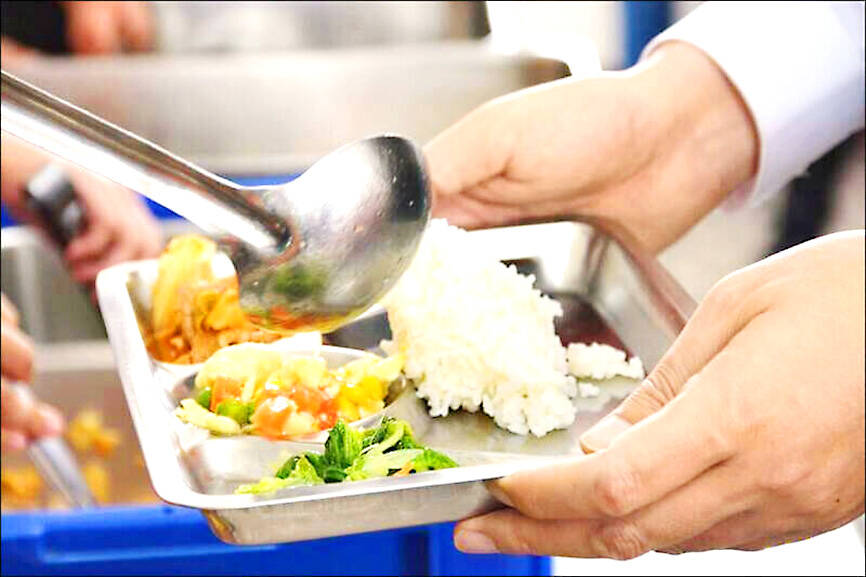The Legislative Yuan yesterday passed the Nutrition and Healthy Diet Promotion Act (營養及健康飲食促進法), authorizing the establishment of a nutritional value database and penalties for incorrect content labeling.
The act still needs to be signed by President Tsai Ing-wen (蔡英文) before it is promulgated.
Taiwan needs to cut down on how much unhealthy food is sold and disseminate factually correct information on diet if the government’s duty to protect public health is to be fulfilled, lawmakers said in the bill’s statement of purpose.

Photo: Yang Yuan-ting, Taipei Times
Japan, South Korea, the US and other developed countries already have mechanisms to monitor the diet and nutrition of their citizens, teach good dietary habits and improve nutritional quality, they said.
Democratic Progressive Party Legislator Wu Yu-chin (吳玉琴) said that the bill codifies the survey and database-building efforts that the Ministry of Health and Welfare has already achieved.
It requires health officials to consult with the broader community of health experts in setting diet policy, Wu said.
In addition, the law specifies that government agencies must establish a budget for promoting better diets, she said.
It stipulates that deliberately spreading erroneous information about food or diet via a public medium, including television, radio and the Internet, is punishable by fines of NT$30,000 to NT$300,000 (US$959 to US$9,594), which can be repeated if there is failure to comply.
The bill stipulates that local health officials are to bar erroneous information about food or diet from being distributed on public media, including television, radio and the Internet.
The bill requires the ministry to institute a regular national diet survey, maintain a nutritional content database and publish comprehensive diet guidelines for different demographic groups.
The guidelines should be revised every five years and take dietary restrictions into account, including those stemming from religion or culture, it says.
The government is to deal with problems the surveys identify through public education to target unhealthy trends or by encouraging manufacturers to utilize nutritional additives, the bill says.
Health officials must address malnutrition among residents of remote regions in Taiwan who lack access to specific types of foods by providing subsidies and improving food supplies, it says.
The ministry and other agencies should promote nutritional knowledge among doctors, nurses, care workers, public health professionals and food industry technicians, it says.
Incentives should be established to encourage charities and other non-governmental groups that receive public funding to provide nutrition training to staff, it says.
Government agencies should ensure nutrition training is provided for their social welfare, child welfare, long-term care, healthcare and military personnel, it says.
Separately, lawmakers passed amendments to the Sports Industry Development Act (運動產業發展條例) to enhance penalties for ticket scalping.
The amendments stipulate that selling tickets for sporting events above the price set by organizers is punishable by a fine of 10 to 50 times the face value of the tickets.
Scalpers who use forged credentials or other illicit means to buy tickets in bulk would face up to three years in prison, commutable by a fine of no more than NT$3 million, the amendments say.
Reasonable surcharges for group purchases of seating at events to cover overhead or mailing costs are exempt, they say.

Taiwanese Olympic badminton men’s doubles gold medalist Wang Chi-lin (王齊麟) and his new partner, Chiu Hsiang-chieh (邱相榤), clinched the men’s doubles title at the Yonex Taipei Open yesterday, becoming the second Taiwanese team to win a title in the tournament. Ranked 19th in the world, the Taiwanese duo defeated Kang Min-hyuk and Ki Dong-ju of South Korea 21-18, 21-15 in a pulsating 43-minute final to clinch their first doubles title after teaming up last year. Wang, the men’s doubles gold medalist at the 2020 and 2024 Olympics, partnered with Chiu in August last year after the retirement of his teammate Lee Yang

FALSE DOCUMENTS? Actor William Liao said he was ‘voluntarily cooperating’ with police after a suspect was accused of helping to produce false medical certificates Police yesterday questioned at least six entertainers amid allegations of evasion of compulsory military service, with Lee Chuan (李銓), a member of boy band Choc7 (超克7), and actor Daniel Chen (陳大天) among those summoned. The New Taipei City District Prosecutors’ Office in January launched an investigation into a group that was allegedly helping men dodge compulsory military service using falsified medical documents. Actor Darren Wang (王大陸) has been accused of being one of the group’s clients. As the investigation expanded, investigators at New Taipei City’s Yonghe Precinct said that other entertainers commissioned the group to obtain false documents. The main suspect, a man surnamed

US Secretary of the Treasury Scott Bessent and US Trade Representative Jamieson Greer began talks with high-ranking Chinese officials in Switzerland yesterday aiming to de-escalate a dispute that threatens to cut off trade between the world’s two biggest economies and damage the global economy. The US delegation has begun meetings in Geneva with a Chinese delegation led by Chinese Vice Premier He Lifeng (何立峰), Xinhua News Agency said. Diplomats from both sides also confirmed that the talks have begun, but spoke anonymously and the exact location of the talks was not made public. Prospects for a major breakthrough appear dim, but there is

The number of births in Taiwan fell to an all-time monthly low last month, while the population declined for the 16th consecutive month, Ministry of the Interior data released on Friday showed. The number of newborns totaled 8,684, which is 704 births fewer than in March and the lowest monthly figure on record, the ministry said. That is equivalent to roughly one baby born every five minutes and an annual crude birthrate of 4.52 per 1,000 people, the ministry added. Meanwhile, 17,205 deaths were recorded, resulting in a natural population decrease of 8,521, the data showed. More people are also leaving Taiwan, with net